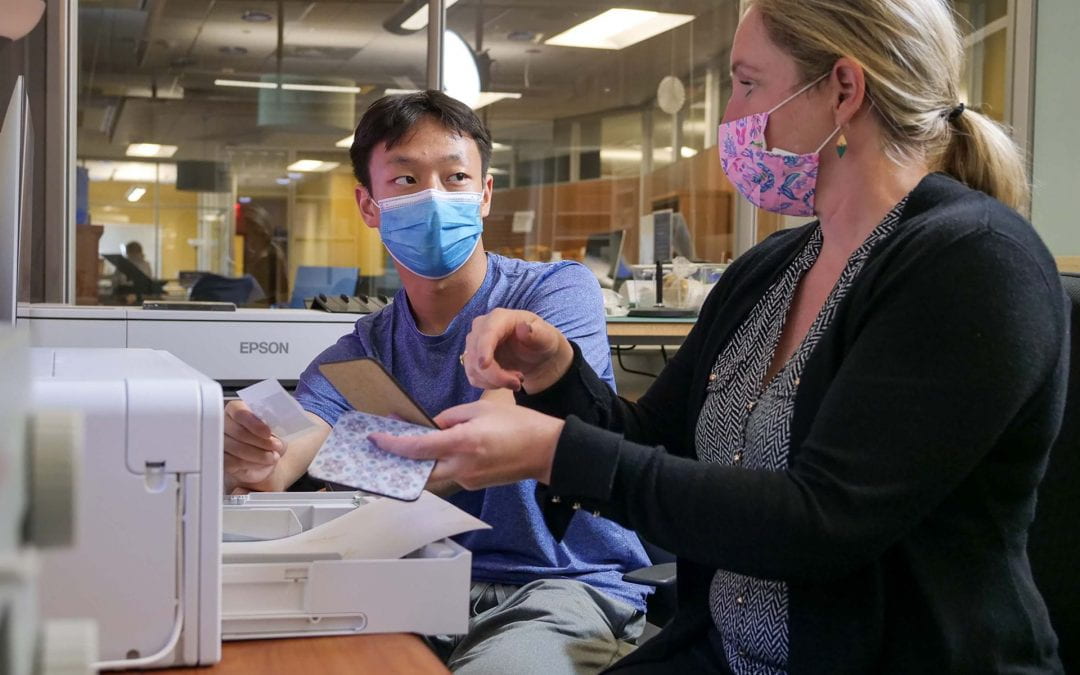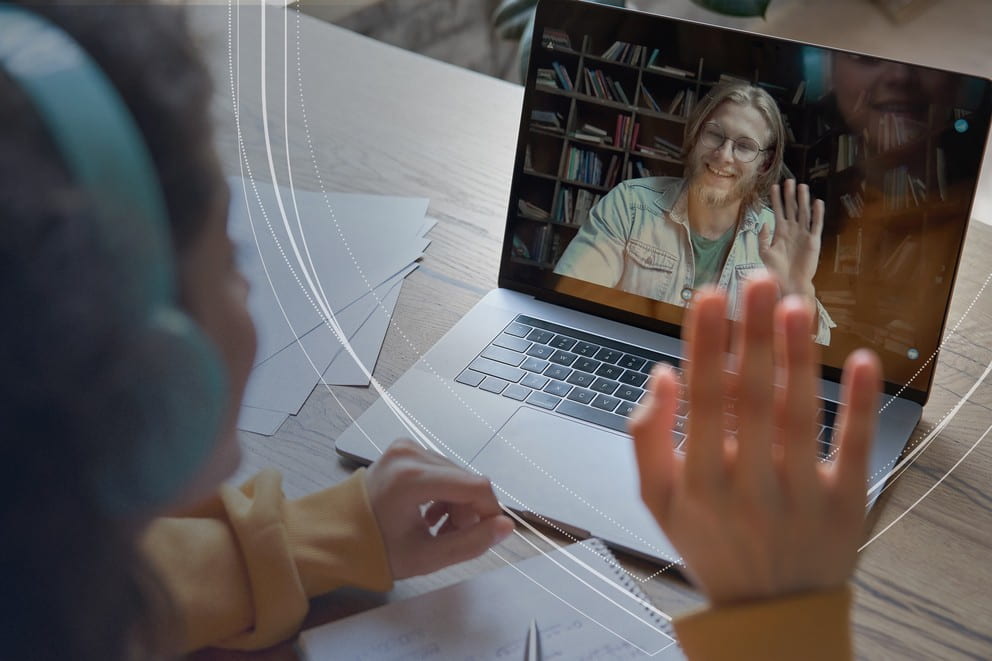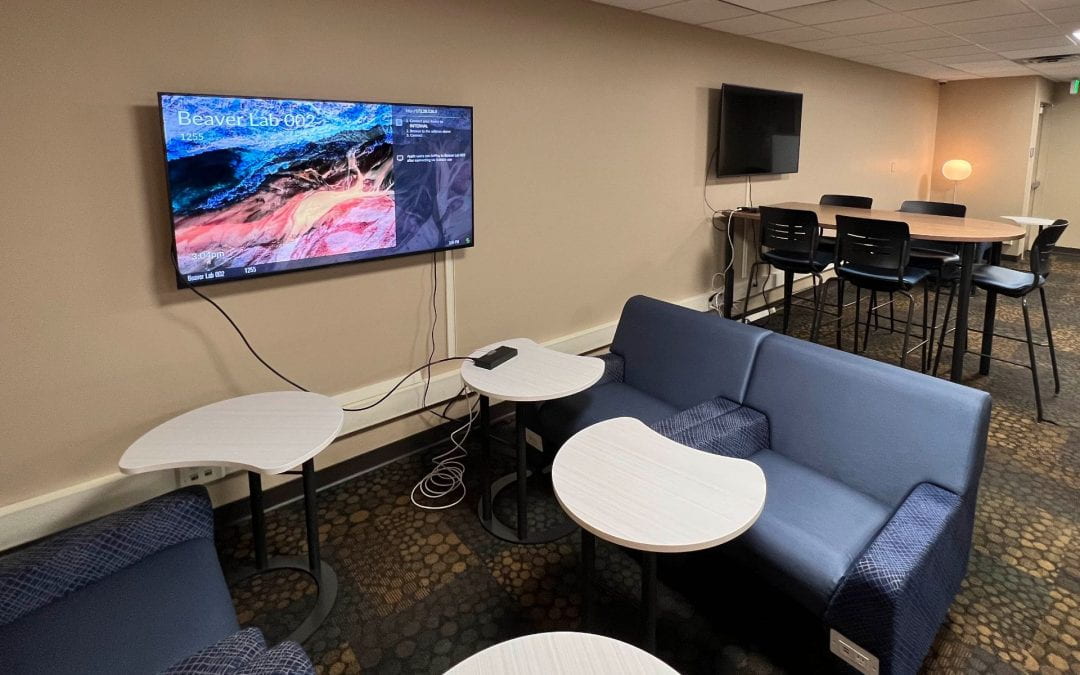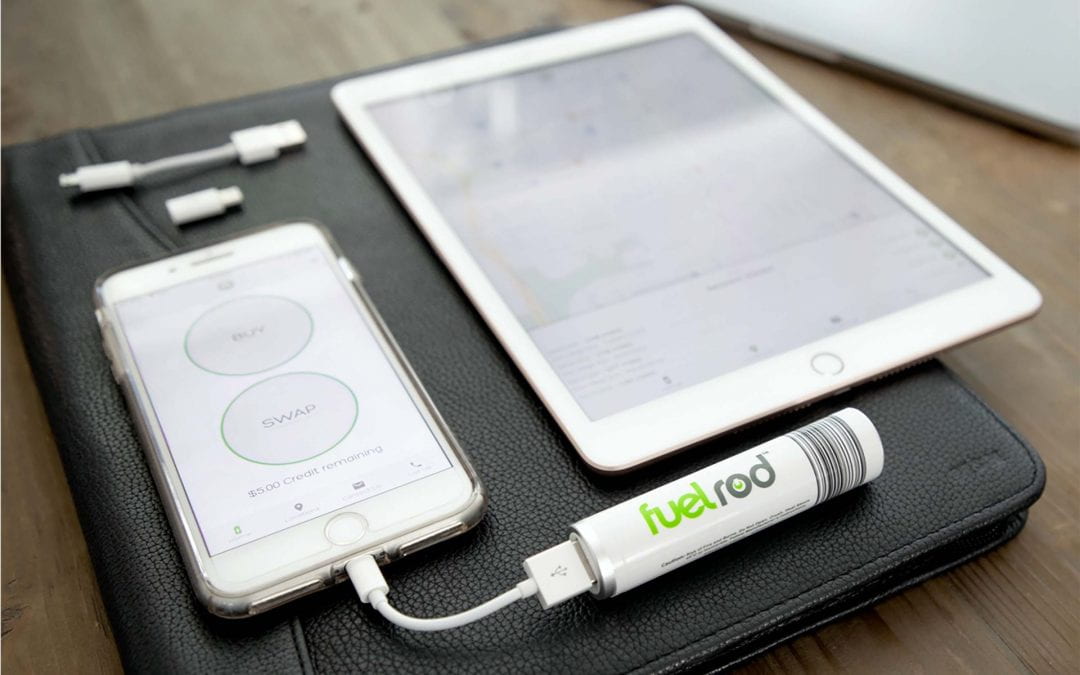
Nov 11, 2021 | Home Page
Penn State’s return to primarily in-person instruction allows for increased access to on-campus teaching and learning resources. Maker Commons, located inside Pattee Library at University Park, is one such resource that has been utilized by nearly 3,000 students since 2018.
“We’re thrilled to have faculty and students back inside Maker Commons this fall,” said Bart Pursel, director of innovation for Teaching and Learning with Technology. “Our staff has worked hard to update the technology and services available at Maker Commons so that faculty and students get the support needed to fuel their innovation and creativity.”
Faculty and students will be able to explore the educational power of newly-added physical prototyping technology such as; dye sublimation, E-textiles, consumer-level die cutters, robotics kits, and sewing. Maker Commons also continues to offer access to 3D printing, 3D scanning, and microprocessing and circuitry.
For those who have an interest in digital prototyping and wish to think creatively about how to incorporate these technologies into their coursework, you can reach out to a consultant for a consultation with a Maker Commons consultant, or schedule a workshop for your class. New to the lineup this year are sessions in 3D modeling in virtual reality and Adobe Illustrator for Cricut. There are also workshops available for prototyping app development with Adobe XD, Arduino with Tinkercad and 3D modeling with Tinkercad.
Maker Commons resources are available at every Penn State location throughout the Commonwealth. There are many options to get in touch with the team and bring the educational power of making to your class.

Oct 26, 2021 | Home Page
On November 1, 2021, the Zoom vendor is implementing a forced update to at least Zoom version 5.5.0. All Zoom users will need to download and install the latest Zoom version to avoid any disruption.
Users will not be able to join a Zoom meeting until they upgrade. The workaround would be to use the Zoom Web version.However, it is strongly recommended that users are using the latest version of Zoom to ensure optimal Zoom security.
Some departments and units may require a local IT administrator to assist in upgrading Zoom to the latest version on all their users’ devices.
There are also a number of upcoming features available in Zoom, such as adding Gender Pronouns. However, in order to take full advantage of these features, users need to download and install Zoom version (5.8) or higher on all devices, including desktop computers, laptops, and mobile devices.
Please refer to this knowledge base article for more information:
For the latest Zoom updates, news, resources, support, and training information, visit zoom.psu.edu.
If you have any questions, please contact the IT Service Desk by calling 814-865-HELP or sending an email to zoom@psu.edu.

Oct 19, 2021 | Home Page
Teaching and Learning with Technology (TLT) recently completed renovations to the computer lab inside Beaver Hall. The redesigned lab is now open and available for students to use.
“We took on this project to provide University Park students with access to modern amenities and a collaborative space,” said Jennifer Sparrow, deputy chief information officer for Penn State and associate vice president for Teaching and Learning with Technology. “It will be a thrill to see what good work comes from the students who visit the lab,” she added.
Highlights of what is now available to students in the Beaver Hall computer lab include:
- Work stations with 27-inch monitors to connect with students’ personal laptops
- Work stations with University-provided computers (PCs and Macs)
- Lounge-style seating with device charging outlets
- Mobile and fixed whiteboards
- Collaboration areas for small and large groups
- Multiple 55-inch display screens with wireless screen sharing systems
“The Beaver Hall lab also provides us with a great opportunity to understand how we can best modernize computer labs across Penn State,” noted Sparrow. “We are approaching this as a prototype and plan to learn a lot from what takes place inside the lab.”
Beaver Hall is located within the Pollock housing area, and students who are interested in using its computer lab are encouraged to check its days and hours of availability.

Sep 9, 2021 | Home Page
Beginning this fall, Penn Staters’ mobile devices won’t be in danger of running out of battery power while they are on campus. Thanks to FuelRod portable charging system kiosks placed strategically at University Park, students, faculty, and staff can power up wherever they are.
“Our faculty continue to innovate in the classroom with mobile device technology. So, we must support that teaching and learning initiative by providing a resource that ensures phones and tablets are ready to use,” said Jennifer Sparrow, deputy chief information officer for Penn State IT and associate vice president for Teaching and Learning with Technology.
“For example, Top Hat is the cloud-based teaching tool Penn State provides to help increase students’ engagement with course materials,” Sparrow added. “A portable mobile device charging solution helps ensure every student at University Park is prepared to use Top Hat during class.”
FuelRod kiosk locations across University Park will provide students with convenient access during the school day. Look for them at the HUB-Robeson Center, the commons areas in East, South, North, and Pollock residence areas, and the Business Building. Additionally, Penn Staters can access a map of University Park kiosk locations by clicking “Locations” on the FuelRod website.
The kiosks are scheduled to come online for purchases the afternoon of Friday, September 10.
Also, on Penn State football game days, fans can take advantage of three FuelRod stations located in and around Beaver Stadium.
A FuelRod purchase at any kiosk includes the portable charging unit and adapters for iOS and Android devices. The portable units, when out of power, can then be recharged at a wall outlet using a USB cable or swapped out for a new one at a campus kiosk.
There are two FuelRod subscription options available to Penn Staters. A $20 subscription comes with a FuelRod kit and credit for 12 free kit swaps at any Penn State-located kiosk. The $25 subscription covers six months and features unlimited kit swaps at any FuelRod location nationwide. The six-month subscription can also be renewed for $10 upon its expiration.
Answers to commonly asked questions can be found by clicking the “FAQ” link on FuelRod’s site.

Aug 24, 2021 | Home Page
In 1998, professor Stuart Selber created Penn State’s first online English class, and in 2021 he received the Teaching and Learning with Technology (TLT) Impact Award. These achievements bookend over 20 years at the University in which Selber has leveraged technology to help engage students and transform education.
A scholar in the field of rhetoric, with a specialty in technical communication, Selber has recognized the ever-growing presence of technology in education and understands the need to marry it with sound pedagogy, saying, “Digital technology is the new English studies. It allows us to reinvigorate how we think about things.”
Selber’s technical innovation is prominent in his English 202C course, where he has implemented littleBits to facilitate technical communication. The lesson requires students to use littleBits, electronic components that snap together, to construct an invention and write instructions for how to do so. Later, classmates share the instructions with their peers who recreate the inventions.
The goal of the lesson, according to Selber, is to teach students to write in a clear, succinct language that considers their audience; communication skills that can serve students well in their professional lives.
“Students bring a lot of expertise with them. I want students to pursue their interests, have a stake in their learning, and express all of that by teaching others how to do things. That’s what littleBits is really about─ that level of engagement,” Selber said.
Engaged learning is a foundational element of the University’s strategic plan and a principle that Selber shares and incorporates into his pedagogy.
“Digital writing has created so many interesting questions, both about teaching and learning. What is the best way for students to learn? To take a course? To integrate technology? It just seems like the sky’s the limit when you work in this area.”
Selber’s role as professor of English only scratches the surface of his leadership in technological innovation. As director of Penn State’s Digital English Studio, Selber played an integral role in the University’s transition to online learning following the onset of COVID-19.
Before the pandemic, Selber assumed responsibility for the online World Campus portfolio, streamlining the online class design and implementation process. With the infrastructure of his online English 15 and English 202C classes at his disposal, coupled with the online teaching tutorials created through the Digital English Studio, Selber could share his design and expertise with all Penn State faculty.
“It was an emergency situation for everybody. But we were helped out a lot by the fact that we already had online versions of courses that the Studio developed, that we were able to roll out basically over a weekend.”
As years pass and new tools become available, education has no option but to evolve and transform. However, it takes creativity, strategic thinking, and leadership skills to make those transformations successful and meaningful. Selber has been a steady source of positive transformation in his time at Penn State. Over his 23 years at the University, Selber has seen tech advances like mobile devices and high-speed wireless internet profoundly impact teaching and learning.
Under his direction, the Digital English Studio provides tech expertise to both faculty and students in pedagogy, usability, and strategy. The Studio offers undergraduate and graduate students internship opportunities, giving them hands-on experience running the English department’s social media, designing online courses and more. The Studio also oversees the Teaching with Technology certificate program, which Selber coordinates. The program helps graduate students and lecturers in English develop teaching with technology philosophy statements, integrate technology into their courses and design digital teaching portfolios.
In addition to Selber’s commitment to advancing the fields of rhetoric and technical communication, he has a passion for learning and developing his peers and students. He sees his work as endlessly fascinating and remains humble about his accomplishments.
“My secret has been to show up every day. I see my success as the product of small, daily efforts.”
Selber sees himself as a part of a Penn State faculty and staff community committed to transforming knowledge and engaging students. The TLT Impact Award annually celebrates and recognizes those like Selber who marry pedagogy with technology to help develop digitally fluent students. Penn Staters across the Commonwealth can learn more about the award and submit nominations through the TLT website.




